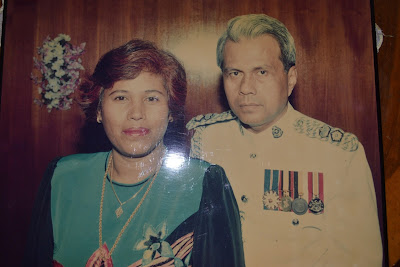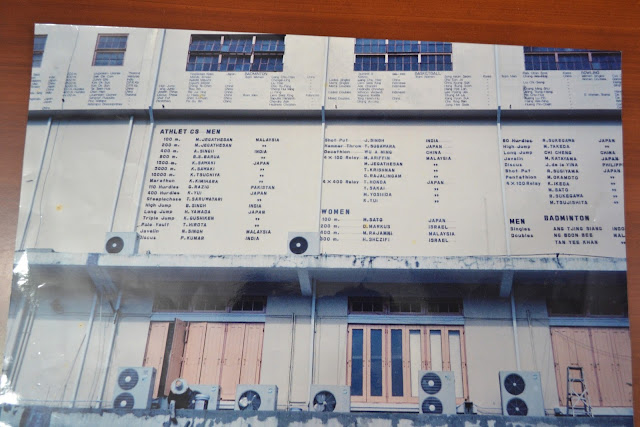Story and pictures Tony Mariadass
Mohd Ariffin Ahmat etched a name for himself as a sprinter in an era
when there were so many good athletes all trying to establish themselves.
No doubt M. Jegathesan (now Tan Sri Dr Jegathesan) was the top athlete
then, there were the likes of Gunaratnam Rajalingam, Thamboo Krishnan and Ooi
Hock Lim for Ariffin to compete against to stand out.
“Those days the competition was keen as there were several athletes all
clocking below 11 seconds. We had to work hard and were bent in beating each
other,” recalled the grey-haired Ariffin who turned 69 on May 11.
“We used to beat each other very often and the only person I could not
beat was Jegathesan. He was simply good and a cut and class above us.”
Ariffin said every time he improved his time, someone else will do
better.
“We had to continuously improve our timings to stay relevant,” who had a
personal best of 10.6 for the century event.
Ariffin a 100m and 200m athlete, gave up the latter to concentrate on
the sprint to do well and earn a place in the national relay team.
“With Jegathesan dominating the sprint event, we were left to find a
place in the relay team. Even then, we had to fight for a place,” said Ariffin
who was the first to qualify for the 1968 Mexico Olympics 4 X 100 team.
But at the Games, he was only a reserve as five runners qualified and
made the trip.
“I was the first runner of the team and Ooi was doing better than me
then and he ran in my place with Krishnan the second runner, Rajalingam as the
third and Jega the anchor.
“But I had no regrets not being able to run. It would have been great if I had run, but to have qualified to the team and being at the Olympics was an achievement I am proud of,” said Ariffin who is married to his neighbourhood sweetheart in Gombak, Hasmah Hamzah and has four children – two girls and two boys (Azwan Hadzree, Aida Yufani, Amila Yasmin and Azril Hamzah).
“But I had no regrets not being able to run. It would have been great if I had run, but to have qualified to the team and being at the Olympics was an achievement I am proud of,” said Ariffin who is married to his neighbourhood sweetheart in Gombak, Hasmah Hamzah and has four children – two girls and two boys (Azwan Hadzree, Aida Yufani, Amila Yasmin and Azril Hamzah).
The quartet qualified for the semi-finals and clocked 40.89 after having
clocked 40.68 in the qualifier.
Ariffin recalled that each athlete was given US$60 for the trip to
Mexico and when he landed back at Subang Airport, he had fifty Hong Kong cents
in his pocket.
“Our last transit was in Hong Kong and we had a meal at the airport and
all I left was fifty cents. If my wife had not come to the airport, I probably
had to walk home to Gombak,” laughed Ariffin the former Police officer who
retired in 1999 as the OCPD for Sungei Petani with the rank of Assistant
Commissioner of Police (ACP).
Ariffin, a Klang-born, had his early education in Sekolah Kebangsaan
Klang, before moving to High School Klang and then to La Salle Klang, took up
athletics as a Form Three student.
“I used to play rugby but when I broke my arm, I decided to try out
athletics. I did well and decided that I will take it up seriously. I trained
on my own and used the old airport Klang at Pandamaran as my training ground
and ran on the runway. I used run with a middle distance runner Vairavan to
build my stamina.
“What was supposed to have been a climax of my schools athletics when I
was selected to run for Selangor turned out in disappointment. We travelled by
bus from Klang and after arriving at the Klang bus station in Kuala Lumpur, we
walked to Victoria Institution where the meet was held. But through some
oversight by the teacher in charge, when we arrived at VI, the race had already
been run.
“After school I was working for Port Klang authority as which came under
the Malayan Railways and I was running with them before representing Selangor.
“I then switched jobs to join
Dewan Bahasa dan Pustaka and it was
here that my athletics career really took off as I joined the Jets Athletics
Club.
“Indonesia coach Stanley Geow (national coach and later became fitness
coach and team manager of Indonesia national team) who was with Jets assisted
me a great deal and he was a coach who understood the athletes individually had
personalised programmes.
“For instance, because of work and transportation problems I sometime
cannot attend the trainings in Kampong Pandan or Lake Gardens, but had
programmes for me to do when I got home.
“So I used to train on the clay road on the row of my houses under the
streetlights placing starter block and markers and my neighbours that I was
mad.
“It was only when my name appeared in the newspapers they realised the
“mad boy” was actually a national athlete.
“Our trainings included time trials every weekend and at the end of the
month competed in inter-club championships in the various state including
Singapore,” said Ariffin whose athletics career spanned from 1960 to 1969.
He said it was when he was competing in the Selangor state meet at
Merdeka Stadium when a gentleman by the name of Lim (the father of late hurdler
Lim Heng Suan) called out to him and gave him the best piece of advice when
made him improve by leaps and bounds.
“This gentleman called out to me after my race from the stand and when I
approached him he said: there is nothing wrong with you. You can go far. But
only one thing. You laugh and everyday laughs. But when everyone talks, you do
not talk. Open up and let out. You need to relax and your body will be more
supple and you will do well.
“It was from that day that I discarded my introvert personality and
mixed freely and I realised I was much more relaxed and my performance
improved,” said Ariffin who joined the Police Force in 1968.
“I was supposed to have join the Force earlier, but my father objected
and only managed to persuade him later when I explained that it will be good
for both my career and athletics.”
In 1963 he represented Malaya in the Malaya Games where Singapore, Sabah
and Sarawak competed.
He went on to represented in two Sea Games (1965 in Kuala Lumpur and
1967 Bangkok) winning the 4 X 100m gold medal, 1967 Bangkok Asian Games winning
the relay gold and in a Games record time of 40.6, in 1967 winning another gold
in the Indonesia Open and the 1968 Mexico Olympics.
Ariffin said that the Asian Games gold medal was his most memorable
moment as they were favourites to win and lived up to expectations.
“I was the first runner and as I was preparing my starting block I heard
a voice from the stand saying “bikin
semangat (roughly translated show spirit)”. I was curious whose voice it
was when I turned I saw our American
coach Bill Miller. That really inspired me and I ran my race of life,” said
Ariffin.
“Having clocked the best time in heats, we were on lane three and by the
time I passed the baton to Krishan, the two runner behind me were still
trailing, while I had pulled level with runners ahead of me. I was relieved
that I had done my job and did not drop the baton. When Krishnan too off, I
knew we had won the race as he was already in the lead. The rest was history,”
said Ariffin who is known as the best curve runner.
Ariffin has a natural tendency of running close to the lines of the next
track to gain maximum advantage, which earned him the best curve runner
acknowledgement.
“It was a Games record and what made even more memorable was that our
names together with all gold medalists of the Games etched on the walls of the
Stadium even before we left Bangkok.”
Malaysia won a total of haul of seven gold, five silver and six bronze
at the Games.
Athletics won five gold - Jegathesan - 100m and 200m; M. Rajamani –
400m; Nashatar Singh – javelin and 4 X 100m team, three silvers - R. Subramaniam
– 800m and 1,500m; and 4 X 400m team Andyappan Nathan, Rengan Pakkri, T. Krishnan and Victor Asirvatham) and
three bronze (T. Krishnan – 200m; Ishtiaq
Mubarak – 110m hurdles; Andyappan Nathan – 400m hurdles and 4 X 100m (Cheryl Dorall, Jacqueline Kleinman, Mary Rajamani and Rajemah Sheikh Ahmad).
Ariffin and his relay
mates were inducted to the Olympic Council of Malaysia Hall of Fame in 2004,
Ariffin, a grandfather of six, has also coached in Taiping and Seremban
and once held the post of vice-president with the Negri Sembilan AAA.
His thoughts about the current state of athletics is that the athletes
are not coached properly and they themselves lack the passion and desire to
excel.
But his Hari Raya wish is that athletics in the country will prosper
again and he believes it has the potential.
“While I wish the athletics fraternity and sports fraternity at large “Selamat Hari Raya dan Maaf Zahir Batin”, I look forward to the day soon to see
the glorious days of Malaysian sports.”









No comments:
Post a Comment